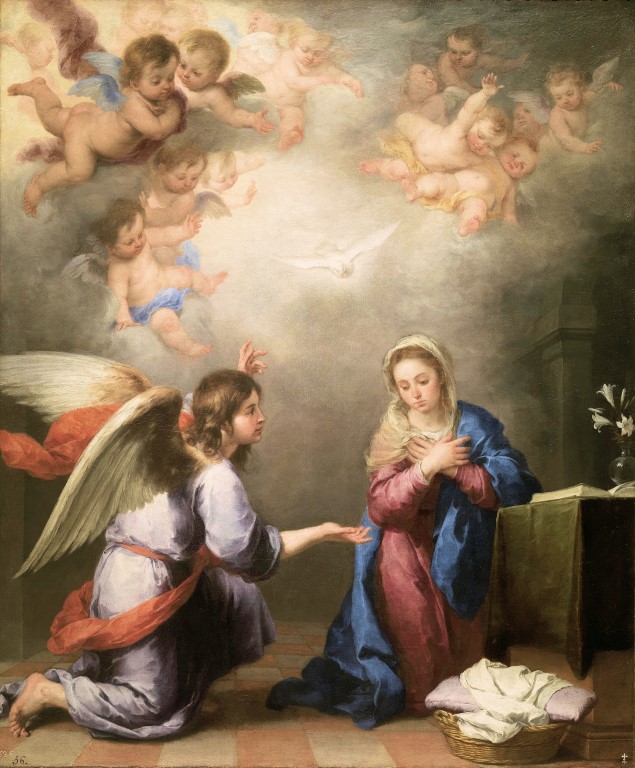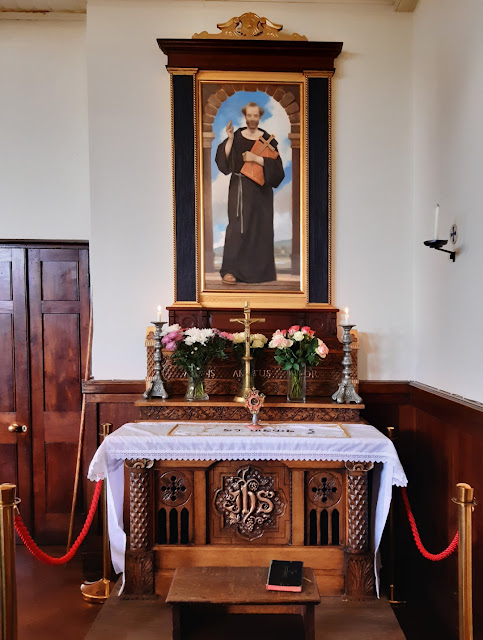Is the Faith Movement modernist because it does not hold the 24 theses?
There has been quite a debate going on over recent weeks about the Faith Movement and I need from time to time to address some of these questions. This post is a little longer than usual and there are no jokes in it. Feel free to pass over it by all means, but do bear it in mind if anyone says to you that Faith priests are all modernists because they do not adhere to the 24 theses.
The Ex Laodicea blog has a post The 'Faith Movement', filed with the tag "modernism" which raises a number of matters, some of which I will address in due course as time permits. For those interested, the pamphlets "Philosophical Perspectives" deal with some of the questions raised. Here, I will deal with just one of them, namely the character of the 24 theses set out in the Decree of the Sacred Congregation of Studies in 1914 (DS 3601-3624).
Aelianus says that the 24 theses were
Distinguo.
The philosophia perennis is essential. The 24 theses are not imposed as of obligation.
My references are taken principally from the very helpful introduction to the Decree in Denzinger-Schonmetzer itself.
The philosophia perennis is indeed taught by the Church as the essential basis of Catholic theology. However, various protestations were made and dubia sent in to the Congregation by those who considered that the Decree might infringe the legitimate liberty of teachers in schools that were less "Thomist", to hold other opinions. Therefore in 1916, the same Sacred Congregation of Studies said that the 24 theses expressed the genuine doctrine of St Thomas and that they were safe directive norms. This indicated that the Congregation did not intend to impose them as of absolute obligation upon the various schools.
In 1917, Pope Benedict XV wrote to the General of the Jesuits, Fr Vladimir Ledochowski saying that he had judged rightly in saying that there was no obligation imposed of holding all of the theses, and that if the Jesuits were to dispute various customarily disputed questions they should not fear that by doind so they were giving less than proper obsequium to the Roman Pontiff.
(The introduction in Denzinger-Schonmetzer continues with a number of other references to allocutions from Pius XI and Pius XII which I will look up in the Acta Apostolicae Sedis when I next have access to it.)
As for Humani Generis, the paragraphs cited refer to tentatives named by Pius XII as "the concepts of modern philosophy, whether of immanentism or idealism or existentialism or any other system" (n.15) and he refers to those who have contempt for terms and notions habitually used by scholastic theologians. He does not say that the 24 theses are of obligation.
Aelianus also draws up Optatam Totius n.15 in support. Therefore I will quote it:
It is important that the philosophia perennis is given its proper place in the Church and the Faith Movement does not dispute this at all. The discussions about materia prima, substance and accident, intellectus agens, co-relative substance etc. are a part of this respectful approach to the philosophia perennis.
For those who have Latin and would like to look up the references, I will quote the introduction from Denzinger for the record. I will put it in small print for the sake of my regular readers' scrolling speed. If you are interested, you can enlarge the font size in your browser or cut and paste the text to read it more comfortably in a Word Processor or something:
3601-3624: Decr. S. Cgr. Studiorum, 27 Iul.1914
Pius X in Motu Proprio “Doctoris Angelici”, 29. Iun. 1914, scholis philosophicis Italiae praeceperat, ut, “principia et maiora Thomae Aquinatis pronuntiata sancte teneantur”. Inde quidam Thomistae ansam arripuerunt, ut ex disciplina metaphysica 24 theses ab iisdem propugnatas S. Studiorum Congregationi “examinandas” proponerent. Aliis videri potuit, ut hae theses, vi approbationis et promulgationis, obtruderentur scholis minus Thomisticis contra earum convictionem, et libertatem tuendi alias sententias auferrent. Cum ob eam rem protestations et dubia commoverentur, eadem Congregatio 7. Mart. 1916 declaravit: “Omnes illae 24 theses philosophicae germanam S. Thomae doctrinam exprimunt, eaque proponantur veluti tutae normae directivae” (AAS 8 [1916] 157). Non ergo absolutam obligationem imponunt, sicut neque exigitur ad “adhaerendum Sancto Thomae”, ut quis systema doctrinale S. Thomae qua totum adoptet.. Quo latiore sensu hae normae directivae intelligendae sint, elucet maxime ex Ep. Benedicti XV “Quod de fovenda” 19. Mart. 1917 ad Generalem S. I. Wlodimirum Ledochowski, data (Acta Romana S. I. 9 [1917] 318s / ZKTh 42 [1918] 206s):
“Neque minus iucunde animadvertimus aequa te lance rationum momenta perpendisse, quibus quemadmodum oporteat a S. Thomae doctrinis esse, hinc inde disceptando contenditur. Quo quidem in iudicio recte Nos te sensisse arbitramur, quum eos putasti Angelico Doctori satis adhaerere, qui universas de Thomae doctrina theses perinde proponendas censeant, ac tutas ad dirigendum normas, nullo scilicet omnium amplectendarum thesium imposito officio. Eiusmodi spectantes regulam, possunt Societatis alumni iure timorem deponere, ne eo quo par est obsequio iussa non prosequantur Rom. Pontificum, quorum ea constans sententia fuit, ducem ac magistrum in theologiae et philosophiae studiis S. Thomam haberi opus esse, integro tamen cuique de iis in utramque partem disputare, de quibus possit soleatque disputari”.
Conferre iuvat, quae in eandem sententiam protulerunt Pius XI: *3666; Pius XII: Alloc. Ad alumnos 24. Iun. 1939 (AAS 31 [1939] 246; Alloc. ad sodales O. Pr. 22 Sept. 1946 (AAS 38 [1946] 387) et maxime Alloc ad membra Univ Gregorianae occasione iubilaei quarti saeculi expleti, 17. Oct. 1953 (AAS 45 [1953] 684-686).
[Feel free to point out any transcription errors.]
The Ex Laodicea blog has a post The 'Faith Movement', filed with the tag "modernism" which raises a number of matters, some of which I will address in due course as time permits. For those interested, the pamphlets "Philosophical Perspectives" deal with some of the questions raised. Here, I will deal with just one of them, namely the character of the 24 theses set out in the Decree of the Sacred Congregation of Studies in 1914 (DS 3601-3624).
Aelianus says that the 24 theses were
[...] enforced by the Code of Canon Law in 1917. This provision and its centrality was reasserted by Pius XII in his 1950 Encyclical Humani Generis §16-18 in a passage cited by Vatican II’s Decree Optatam Totius §15 when it prescribes the Perennial Philosophy for the training of Priests.later he says:
The Twenty Four Theses define the indispensable minimum core of this Perennial Philosophy without which only the verbal form of the Church’s doctrine remains with the content removed. Stat crux dum volvitur orbis...Therefore the Faith Movement's central ideas are incompatible with Catholic teaching.
Distinguo.
The philosophia perennis is essential. The 24 theses are not imposed as of obligation.
My references are taken principally from the very helpful introduction to the Decree in Denzinger-Schonmetzer itself.
The philosophia perennis is indeed taught by the Church as the essential basis of Catholic theology. However, various protestations were made and dubia sent in to the Congregation by those who considered that the Decree might infringe the legitimate liberty of teachers in schools that were less "Thomist", to hold other opinions. Therefore in 1916, the same Sacred Congregation of Studies said that the 24 theses expressed the genuine doctrine of St Thomas and that they were safe directive norms. This indicated that the Congregation did not intend to impose them as of absolute obligation upon the various schools.
In 1917, Pope Benedict XV wrote to the General of the Jesuits, Fr Vladimir Ledochowski saying that he had judged rightly in saying that there was no obligation imposed of holding all of the theses, and that if the Jesuits were to dispute various customarily disputed questions they should not fear that by doind so they were giving less than proper obsequium to the Roman Pontiff.
(The introduction in Denzinger-Schonmetzer continues with a number of other references to allocutions from Pius XI and Pius XII which I will look up in the Acta Apostolicae Sedis when I next have access to it.)
As for Humani Generis, the paragraphs cited refer to tentatives named by Pius XII as "the concepts of modern philosophy, whether of immanentism or idealism or existentialism or any other system" (n.15) and he refers to those who have contempt for terms and notions habitually used by scholastic theologians. He does not say that the 24 theses are of obligation.
Aelianus also draws up Optatam Totius n.15 in support. Therefore I will quote it:
The philosophical disciplines are to be taught in such a way that the students are first of all led to acquire a solid and coherent knowledge of man, the world, and of God, relying on a philosophical patrimony which is perennially valid and taking into account the philosophical investigations of later ages. This is especially true of those investigations which exercise a greater influence in their own nations. Account should also be taken of the more recent progress of the sciences.So: no 24 theses and in fact an encouragement to take account of the recent progress of the sciences. Which is what the Faith Movement attempts to do in complete fidelity to the Church's magisterium.
It is important that the philosophia perennis is given its proper place in the Church and the Faith Movement does not dispute this at all. The discussions about materia prima, substance and accident, intellectus agens, co-relative substance etc. are a part of this respectful approach to the philosophia perennis.
For those who have Latin and would like to look up the references, I will quote the introduction from Denzinger for the record. I will put it in small print for the sake of my regular readers' scrolling speed. If you are interested, you can enlarge the font size in your browser or cut and paste the text to read it more comfortably in a Word Processor or something:
3601-3624: Decr. S. Cgr. Studiorum, 27 Iul.1914
Pius X in Motu Proprio “Doctoris Angelici”, 29. Iun. 1914, scholis philosophicis Italiae praeceperat, ut, “principia et maiora Thomae Aquinatis pronuntiata sancte teneantur”. Inde quidam Thomistae ansam arripuerunt, ut ex disciplina metaphysica 24 theses ab iisdem propugnatas S. Studiorum Congregationi “examinandas” proponerent. Aliis videri potuit, ut hae theses, vi approbationis et promulgationis, obtruderentur scholis minus Thomisticis contra earum convictionem, et libertatem tuendi alias sententias auferrent. Cum ob eam rem protestations et dubia commoverentur, eadem Congregatio 7. Mart. 1916 declaravit: “Omnes illae 24 theses philosophicae germanam S. Thomae doctrinam exprimunt, eaque proponantur veluti tutae normae directivae” (AAS 8 [1916] 157). Non ergo absolutam obligationem imponunt, sicut neque exigitur ad “adhaerendum Sancto Thomae”, ut quis systema doctrinale S. Thomae qua totum adoptet.. Quo latiore sensu hae normae directivae intelligendae sint, elucet maxime ex Ep. Benedicti XV “Quod de fovenda” 19. Mart. 1917 ad Generalem S. I. Wlodimirum Ledochowski, data (Acta Romana S. I. 9 [1917] 318s / ZKTh 42 [1918] 206s):
“Neque minus iucunde animadvertimus aequa te lance rationum momenta perpendisse, quibus quemadmodum oporteat a S. Thomae doctrinis esse, hinc inde disceptando contenditur. Quo quidem in iudicio recte Nos te sensisse arbitramur, quum eos putasti Angelico Doctori satis adhaerere, qui universas de Thomae doctrina theses perinde proponendas censeant, ac tutas ad dirigendum normas, nullo scilicet omnium amplectendarum thesium imposito officio. Eiusmodi spectantes regulam, possunt Societatis alumni iure timorem deponere, ne eo quo par est obsequio iussa non prosequantur Rom. Pontificum, quorum ea constans sententia fuit, ducem ac magistrum in theologiae et philosophiae studiis S. Thomam haberi opus esse, integro tamen cuique de iis in utramque partem disputare, de quibus possit soleatque disputari”.
Conferre iuvat, quae in eandem sententiam protulerunt Pius XI: *3666; Pius XII: Alloc. Ad alumnos 24. Iun. 1939 (AAS 31 [1939] 246; Alloc. ad sodales O. Pr. 22 Sept. 1946 (AAS 38 [1946] 387) et maxime Alloc ad membra Univ Gregorianae occasione iubilaei quarti saeculi expleti, 17. Oct. 1953 (AAS 45 [1953] 684-686).
[Feel free to point out any transcription errors.]


